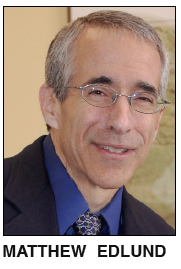MATHEW EDLUND
Contributing Columnist
edlund@lbknews.com
“I can’t sleep!” people keep telling me – even if they’ve slept well their entire lives. “What I  saw today was unbelievable, I can’t get it out of my mind!” Television images of fear, rage, intimidation and destruction seep into their dreams: of friends and neighbors screaming at them to leave their homes, workplaces blasted in fire, wars in the streets while their children fight far away.
saw today was unbelievable, I can’t get it out of my mind!” Television images of fear, rage, intimidation and destruction seep into their dreams: of friends and neighbors screaming at them to leave their homes, workplaces blasted in fire, wars in the streets while their children fight far away.
Not since 9/11 has the clinical population I and others so complained of the inability to turn off and rest. Here is a partial explanation of why – and what to do to change it.
If It Bleeds It Leads
Humans are built to notice the needle in the haystack. We best commit to attention and memory the odd or bizarre – and the emotionally inciting.The Internet potentiates a visually charged era where extremity, virtual and non-virtual of virtually any form, sells and sells and sells. The extraordinary and previously unimaginable stokes and produces ratings, money, influence and power. This is the also media political arena right now.
So when Republican presidential aspirant Donald Trump was discovered tweeting the sayings of Italian fascist leader Benito Mussolini, his response was “it got your attention, didn’t it?”
That was the whole idea.
Getting attention is the particular game of this political cycle, and if posturing violates civility and cultural norms the more attention is “won.” So if Trump says he would date a young woman if she were not his daughter, talks of building continental walls higher than the original Tower of Babel, suggests protesters be beaten or demands terrorist families be targeted for extermination, he unsurprisingly gets maximized attention. Playing to the same wave, terrorist leaders check their social media feeds to see which act of calculated carnage creates the most “hits.”
Such is the “news” that keeps so many of us up at night. It should not.
TV or Not TV, That Is the Question
Huge numbers of Americans say they “fall asleep” watching television. These days, more and more cannot.
With the declining exception of a few benighted public stations desperate to hold onto shrinking Congressionally controlled budgets, most media has a primary goal of making money. They don’t make money if their nightly audience is asleep. And they really know how to keep you up. Alert and ready to ingest the advertising that’s the main source of their cash.
So most media, particularly ones with high visual content, do whatever is in their power to keep you riled as the night wears on – with bold images, lurid colors, noisome soundtracks and remarkably pretty people. And since it changes by the second, a big driver of stimulation is the “news.”
It’s hard to visually dramatize a hundred million people falling victim to Dengue fever. A few hundred Zika virus babies with tiny, misshapen heads gets a lot more “hits.”
Fear, hatred, cheating and loathing keep ratings up. Terrorism in particular sells. Seeing people “just like us” blown to bits in airports and grocery stores are images people can’t forget – and often can’t stop watching. Many patients tell me that the Paris and Brussels attacks “glued” them to their sets for days. Through endless repetition television keeps such images “alive.” That this is exactly what terrorists want. That such attention often provokes the political and military decisions the terrorists also desire receives far from sufficient comment.
So one of the rules of good sleep is particularly relevant in a period of self-promoting, polarizing political machines – turn off the electronics an hour before sleep. Yes, turn them off. Turn down the lights. Calm the mind and body so your body clocks will nudge you into sleep.
The News and the Facts
Americans now frequently complain that their news outlets are “biased” and not reporting the facts.
In fact, bias is normal in any media. Ideology – we all have our own – routinely shapes our perception, acceptance, and description of events.
So when it comes to American news, it may sometimes be best to look overseas. Even if journalistic traditions of reporting “facts” rather than opinion now appears increasingly vestigial, foreigners possess a very different take on American events. In particular the Brits, with their long journalistic traditions and caustic and bemused reading of American affairs, can be looked to in times of high emotion. Virtually all ideological positions are available. I would recommend recourse to the BBC, the Economist, the Financial Times and the Guardian for those who want to have a less conflicted version of what’s going on here. In general, print will prove less inflammatory than visual media, and because of the way the brain shapes information, often more measured.
Another tack to try to emphasize facts. Politifact and other resources attempt to give people some semblance of what is truly real, what is conjecture, and what is propaganda. Reading history, particularly about periods with similar forces like the 1930s, can also calm and clarify the mind.
Bottom Line
Politics and propaganda, images and utterances promoting fear, hatred, loathing and revenge, do not have to keep you up at night. Turn off the electrifying electronics and turn on your analytic powers. For in the end it is better to be an actor than a spectator. The truth may be elusive and may not at all set you free, but it is worth striving for and using as a guide to the actions that control our lives. Democracy depends on informed, active citizens, and knowledge is implicit power. Placed by you in your own hands, knowledge can provide both encouragement and solace, and even help lead you peacefully to your night’s rest.

